
April 30
1893 Birth: Joachim von Ribbentrop: German Foreign Minister 1938-45:
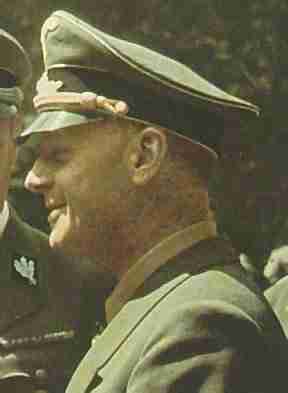
He will obtain his title of nobility through adoption and become prosperous as a result of his marriage to Anneliese Henkell, daughter of Germany's richest champagne maker.
In response to a chance remark by Hitler that he could not follow the foreign press because of his ignorance of foreign languages, Ribbentrop, the wine and spirits importer, was recommended to him as a reader. Ribbentrop not only had a good knowledge of languages but had also been the author of a political newsletter which was sent to business contacts at home and abroad and which took a nationalist and anti-Bolshevik line. Hitler accepted him, influenced not least by his outward appearance as a man of the world. This was the start of a rapid rise in a career of astounding incompetence. For Ribbentrop, who shared Hitler's habit of indulging in great visions expressed in endless monologues, it led into those realms where the megalomaniac word loses its innocence and unexpectedly influences the destinies of nations; where self-assertive coarseness brings the reputation, not of a swashbuckler among neighbors and boon companions, but of a disturber of the peace before the bar of history. Ribbentrop evidently never grasped the difference between these two roles and confronted it during the Nuremberg trial with that same strained mien which a lifelong intellectual helplessness had forced him to adopt. He was condemned as the pothouse politician whose bombastic utterances were suddenly fulfilled as by a malevolent fairy, whose words, dictated by a hunger for self-importance, suddenly became flesh and, even more, blood. It was no doubt his inflated busybody arrogance that also made him the target of so much negative criticism.
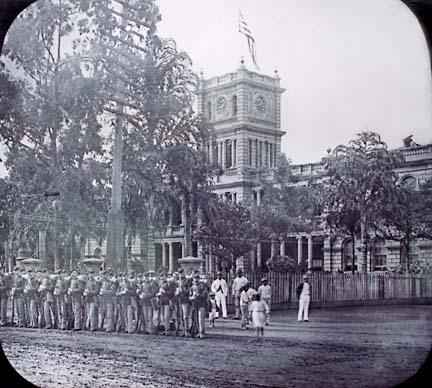
1900 Countdown to Infamy: President McKinley signs the Hawaiian Organic Act (written by Sydney M. Ballou), incorporating Hawaii as a Territory of the United States. Once the act goes into effect on June 14, contract labor becomes illegal in Hawaii. Over 20 major labor strikes soon take place, calling for higher wages, reduced work hours, and the placing of Japanese workers into management positions. (Niiya, Kinzer))
[See: Countdown to Infamy: Timeline to Pearl Harbor.]
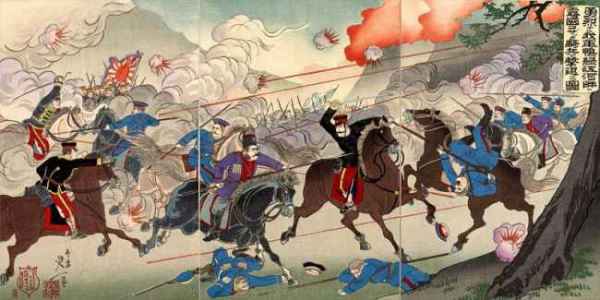
1904 April 30邦ay 1 Russo-Japanese War: The Battle of Yalu River, the first major land battle of the war, takes place on the border between China and Korea. (Nish)

1915 World War I: List Regiment: Gefreiter Adolf Hitler's 16 Reserve Infantry Regiment occupy a position, at Fromelles (pictured above in a drawing by Hitler), which is on a level field with water channels, willow trees and willow stalks, in the distance towards the enemy lines lie an insignificant wood with barbed wire entanglements. Under the direction of their defense-minded commander, Lieutenant General Gustav Scanzoni von Lichtenfels, the regiment works ceaselessly day and night in the subsequent weeks, to further fortify their position at Fromelles. [For further details, Click here.]
1916 World War I: List Regiment: Gefreiter Adolf Hitler endures trench warfare in Flanders (Artois) with 3 Company, 16 Reserve Infantry Regiment. [For further details, Click here.]
1917 World War I: Various:
List Regiment: Gefreiter Adolf Hitler's 16 Reserve Infantry Regiment, 3 Company, participate in the Arras action, being redeployed east of Vimy Ridge. [For further details, Click here.]
Battle of the Boot:
On this day in 1917, the so-called Battle of the Boot marks the end of the British army's Samarra Offensive, launched the previous month by Anglo-Indian forces under the regional commander in chief, Sir Frederick Stanley Maude, against the important Turkish railroad at Samarra, some 130 kilometers north of Baghdad, in Mesopotamia (modern-day Iraq). [For further details, Click here.]
1918 World War I: List Regiment: Gefreiter Adolf Hitler's 16th RIR constructs fortified works in difficult defensive positions on an active front with German assault regiments near Fountaine (Montdidier). [For further details, Click here.]
1919 Thule Society: Murder:
Seven hostages from the Thule Society are taken to the cellar of the Luitpold Gymnasium, a Red Army post since mid-April, and executed, supposedly in reprisal for the killing of Red prisoners by Whites at Starnberg. (THP)
1920 Weimar: Rudolf Hess resigns his commission in the German army at Munich. (THP)
1923 Birth: Marianne Paegel (in Kirchberg, Austria): a guard at the Mauthausen concentration camp during the last months of World War II.
In 1944 she was conscripted to be a camp guard and sent to Mauthausen. On November 4, 1944 she began her training under Jane Bernigau. Eventually she oversaw part of the women's camp in Mauthausen. When the camp was about to be liberated, Marianne fled and was never charged with war crimes. [For further details, Click here.]
1927 Hitler's Austrian citizenship is revoked by the Upper Austrian Land government in accordance with his request, rendering him stateless. See Feb 25. (Maser)
[See: Austria: The Other Germany.]1928 From an essay by Goebbels published in Der Angriff:
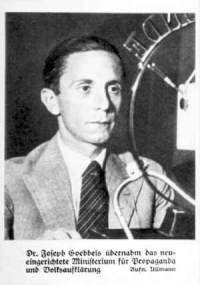
We are an anti-parliamentarian party that rejects for good reasons the Weimar constitution and its republican institutions. We oppose a fake democracy that treats the intelligent and the foolish, the industrious and the lazy in the same way. We see in the present system of majorities and organized irresponsibility the main cause of our steadily increasing miseries. So why do we want to be in the Reichstag? We enter the Reichstag to arm ourselves with democracy's weapons. If democracy is foolish enough to give us free railway passes and salaries: that is its problem. It does not concern us. Any way of bringing about the revolution is fine by us. [For the full text, Click here.]
1935 Holocaust: A Nazi decree prohibits Jews from displaying the German flag.
1937 Church and Reich: Pacelli‑-Papal Secretary‑-replies to Germany's note of protest.
The Holy See, which has friendly, correct, or at least tolerable relations with states of one or another constitutional form and orientation, will never interfere in the question of what concrete form of government a certain people chooses to regard as best suited to its nature and requirements. With respect to Germany also, it has remained true to this principle and intends so to continue. (THP)
1939 Various:
Holocaust: A new German decree causes Jews lose their right to rent protection. Landlords are sanctioned by law to evict Jewish tenants. (THP)
New York World's Fair opens:
The New York World's Fair opens in New York City. The opening ceremony, which featured speeches by President Franklin D. Roosevelt and New York Governor Herbert Lehman, ushered in the first day of television broadcasting in New York.
Spanning 1,200 acres at Flushing Meadow Park in Queens, the fairground was marked by two imposing structures—the "Perisphere" and the "Trylon"—and exhibited such new technology as FM radio, robotics, fluorescent lighting, and a crude fax machine. Norman Bel Geddes designed a Futurama ride for General Motors, and users were transported through an idealized city of the future. Sixty-three nations participated in the fair, which enjoyed large crowds before the outbreak of World War II interrupted many of its scheduled events.
1941 Holocaust: Croatia: The new state introduces its first racial laws, removing all Jews from public office and ordering all Jews to wear a yellow badge. (THP)
1942 Holocaust: From a letter to Reichsfuehrer SS Himmler from SS Obergruppenfuehrer Pohl:
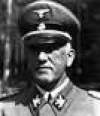
Today I report about the present situation of the concentration camps and about measures I have taken to carry out your order of the 3rd of March 1942 . . . .
1. The war has brought about a marked change in the structure of the concentration camps and has changed their duties fundamentally with regard to the employment of the prisoners. The custody of prisoners for the sole reasons of security, education, or as a preventive measure is no longer the main consideration. The importance now lies in the economic side. The mobilization of all prisoner labor for purposes of the war (increase of armament) now, and for purposes of construction in the forthcoming peace, is coming more and more to the foreground.
2. From this knowledge necessary measures result which require a gradual transformation of the concentration camps from their former one-sided political character into an organization adapted to economic tasks.
3. For this reason I called together all the leaders of the former inspectorate of concentration camps, all camp commanders, and all managers and supervisors of work, on the 23rd and 24th of April 1942 and explained personally to them this new development. I have compiled, in the order attached, the essential points which have to be brought into effect with the utmost urgency if the commencement of work for the purposes of the armament industry is not to be delayed.
4. The camp commander alone is responsible for the utilization of the manpower available. This utilization must be, in the true meaning of the word, complete, in order to obtain the greatest measure of performance. Work is allotted only centrally and by the Chief of the Department D. The camp commanders themselves may not accept on their own initiative work offered by third parties and may not negotiate about it.
5. There is no limit to working hours. Their duration depends on the kind of working establishments in the camps and the kind of work to be done. They are fixed by the camp commanders alone.
6. Any circumstances which may result in a shortening of working hours (for example, meals, roll-calls, etc., have therefore to be restricted to an irreducible minimum. Time wasting walks and noon intervals, only for the purpose of taking meals, are forbidden.
1941 World War II: Various:
Operation Mincemeat: The submarine HMS Seraph surfaces in the Mediterranean Sea off the coast of Spain to deposit a dead man planted with false invasion plans and dressed as a British military intelligence officer. The operation called for making the Germans believe that they had, by accident, intercepted highly classified documents detailing future Allied war plans. It succeeded: the Germans diverted their forces and the Allied invasion of Sicily proceeded smoothly.
Resistance: Warsaw Ghetto:
SS and Police Fuehrer in the District of Warsaw to Higher SS and Police Fuehrer East: Combing out by search parties was continued. Although some giant blocks of buildings now are completely burned out, the Jews continue to stay in the dug-outs 2 to 3 meters below ground. In many cases we are not able to discover those dug-outs unless some Jew, whom we have already caught, gives us a hint as to their whereabouts. Repeatedly, during the last few days, Jews have testified that some armed Jews emerge at night from some hideouts or dug-outs and threaten the other Jews with shooting if they give any signs of life. We were able to ascertain beyond all doubt that several dug-outs had been closed from the outside by these bandits, who tried in this manner to prove that they meant business.
1945 World War II: Various:
Churchill to Truman:

There can be little doubt that the liberation of Prague and as much as possible of the territory of Western Czechoslovakia by your forces might make the whole difference to the post-war situation in Czechoslovakia, and might well influence that in near-by countries. On the other hand, if the Western Allies play no significant part in Czechoslovakian liberation that country will go the way of Yugoslavia. Of course, such a move by Eisenhower must not interfere with his main operations against the Germans, but I think the highly-important political consideration mentioned above should be brought to his attention.

In The Bunker: Jodl replies to Krebs:
Firstly, Wenck's spearhead bogged down south of Schwielow Lake. Secondly, Twelfth Army therefore unable to continue attack on Berlin. Thirdly, bulk of Ninth Army surrounded. Fourthly, Holste's Corps on the defensive." Keitel writes on the bottom: "Attacks on Berlin not advanced anywhere. (Kershaw)
[See: The Last Days of the Third Reich.]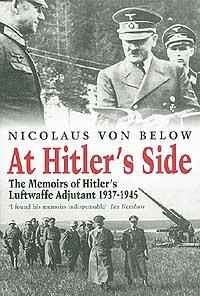
In The Bunker: Nicolaus von Below takes his final leave of the Fuehrerbunker, carrying Hitler's 'last message' to Keitel. (Payne)

In The Bunker: In the early morning hours, Bormann dispatches a message to Doenitz:
DOENITZ! Our impression grows daily stronger that the divisions in the Berlin theater have been standing idle for several days. All reports we receive are controlled, suppressed, or distorted by Keitel . . . . The Fuehrer orders you to proceed at once, and mercilessly, against all traitors . . . . The Fuehrer is alive, and is conducting the defense of Berlin. (Shirer)

In The Bunker: . . . . By late morning, the Soviets have overrun the Tiergarten in Berlin, and one advance unit is reported on one of the streets next to Hitler's bunker under the Reich Chancellery. SS Brigadefuehrer Wilhelm Mohnke, commander of the center sector of Berlin, informs Hitler that the center will be able to hold out for less than two days. Later that morning Weidling informs Hitler in person that the defenders will likely exhaust their ammunition that night and again asks Hitler's permission to break out. At about 13:00 Weidling finally receives Hitler's permission to attempt a breakout in the evening.
[See: Did Adolf Hitler Really Commit Suicide?]
In The Bunker: . . . . Hitler sends for Bormann at noon and informs him that the end is near. He then attends one last lunch with his secretaries and his cook, who prepares spaghetti with a light sauce. Eva is not present, but she joins him after the lunch to shake hands and say sad farewells to the staff. Eva embraces Traudl Junge: 'Please try to get out of here,' she pleads. 'You might make it. Give my love to Bavaria.' Hitler and Eva then enter Hitler's private quarters and close the door behind them. SS-Sturmbannfuehrer Otto Guensche takes up his post at the door, with orders that the couple not be disturbed. (Read, Payne)
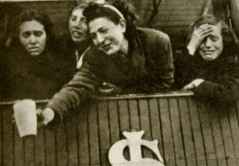
World War II: Soviet forces enter Ravensbrueck concentration camp north of Berlin. Meanwhile, Allied troops capture Munich and French forces cross the border into Austria. At 3:00 PM, American forces in Nuremberg discover the tunnel and underground bunker where the spear of Longinus (the Holy Lance) has been hidden to prevent its capture by the Allies.
In The Bunker:. After the Hitlers retire to their room, Traudl Junge suddenly realizes that, in the excitement, no one had thought to feed the Goebbels' children. She rounds them up, leads them to the tiny dining room, and scrounges up some fruit and sandwich ingredients. Junge will later relate that she 'heard the shot' while making sandwiches and for them. Rochus Misch will later tell Oliver Harvey:
I saw Hitler slumped by the table. I did not see any blood on his head. And I saw Eva with her knees drawn up, lying next to him on the sofa. Hitler was wrapped in a blanket as I watched. He was then taken outside to be burnt. It was over.
Note: There is some dispute in the historical record concerning some of the events of this day. One is the contention that a distraught Magda Goebbels had actually burst in on Hitler and Eva in the privacy of their room, making one last tearful plea to Hitler that he allow himself and the rest of them to escape Berlin and make a last stand at Obersalzberg. However, other eyewitnesses have denied that any such scene actually occurred, and it is quite doubtful that it ever did. Another area of dispute is whether or not the shot that killed Hitler was actually heard by any of the Bunker witnesses. Some say they heard the shot, but others will testify that they did not, and that the door was too soundproof to have allowed the sound to escape. Definitive answers are difficult when eyewitnesses disagree. (Read) [See: Did Adolf Hitler Really Commit Suicide?]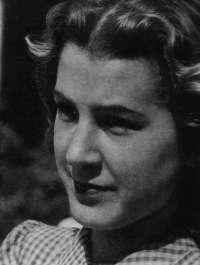
On April 30, 1945, when Hitler and Eva Braun, now married, took their leave in order to commit suicide, Magda Goebbels cried out in shock, 'My Fuehrer, do not leave us; we will perish miserably without you!' Traudl Junge [above], Hitler's secretary, was just giving food to the Goebbels children when she heard a shot coming from Hitler's den. With regard to Magda Goebbels' intentions, there are conflicting reports. Albert Speer believed that 'she found the idea that her children had to die unbearable, but she submitted, it seemed, to her husband's decision.' Two close co-workers of the propaganda minister, however, claimed they had overheard Goebbels suggest to his wife that she flee to the West since they had nothing to fear from the British.
Death In The Bunker: At 3:30 PM, Adolf Hitler and his new wife, Eva Braun, commit suicide in their private quarters under the Chancellery. Their bodies are taken above ground by Hitler's aides, burned with difficulty due to the conditions and the limited supply of gasoline, and buried in a shallow grave formed from a bomb crater. Kempka, Goebbels, Bormann, Krebs, Linge, and Burgdorf give one last Nazi salute to their Fuehrer, before an exploding Soviet shell sends them scurrying back down into the Bunker. (Read)

During the Emperor's flight from Russia in 1812 he speculated as to what the Allies would do if they caught him. 'Can you picture to yourself, Caulaincourt, the figure you would cut in an iron cage, in the main square of London?' He then had a fit of hysteria. Hitler had no illusions. He knew that he would be put on show and then executed . . . . in the one chivalrous gesture of his entire life, he married Eva Braun. Next day both retired to their bedroom to die. Clutching a photograph of his mother, the Fuehrer shot himself, while Eva took poison. Amid his own ruin in 1814 Napoleon confided in a loyal supporter 'My dear fellow, if the Cossacks reach the gates of Paris it's the end of Emperor and Empire.' As it was, Tsar Alexander's Cossacks stabled their horses in Paris. In 1945 Stalin's Cossacks rode into Berlin. Neither capital need have entertained them had it not been for their rulers' madness. Determined to escape from a war on two fronts, both had been destroyed by such a war.
World War II: Goebbels presides at his first and last situation conference as Reich Chancellor. Bormann proposes that the 300 to 500 troops around the Bunker spearhead a breakout through the Soviet lines to link up with Doenitz, but Goebbels rules it out. He decides instead to send General Krebs to the Soviet lines under a white flag with a truce proposal. (Read)
World War II: Bormann and Goebbels again radio Doenitz, without informing him that Hitler is already dead:
The Fuehrer has appointed you, Herr Admiral, as his successor in place of Reichsmarschall Goering. Confirmation in writing follows. You are hereby authorized to take any measures which the situation demands. (Shirer)
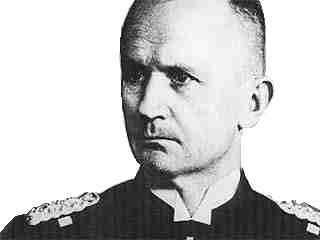
World War II: The bizzare turn of events catching him completely off guard, Doenitz, in shock, has absolutely no desire to succeed Hitler. Believing that Hitler is still alive, he replies to the previous message from the Fuehrer Bunker with as much encouragement as he can muster:
MY FUEHRER! My loyalty to you will be unconditional. I shall do everything possible to relieve you in Berlin. If fate nevertheless compels me to rule the Reich as your appointed successor, I shall continue this war to an end worthy of the unique, heroic struggle of the German people. (Shirer)
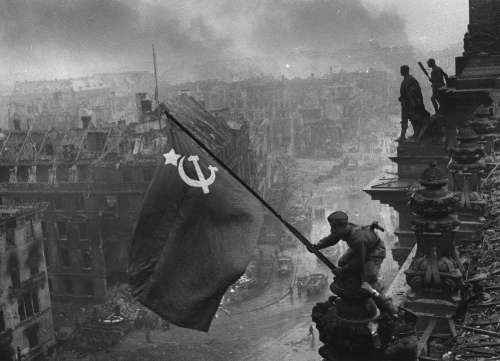
World War II: The Red Army captures the Reichstag at 10:50 PM, hoisting the first of more than forty victory flags, though no photograph can be taken due to the late hour. Various Soviet military units will unfurl and photograph an assortment of flags, of which the one above is the 'official' victory flag, photographed early on the morning of May 1. German artillery will knock it down later that same morning, and it will be replaced in the afternoon only to be taken down on May 3 and eventually shipped to Moscow.
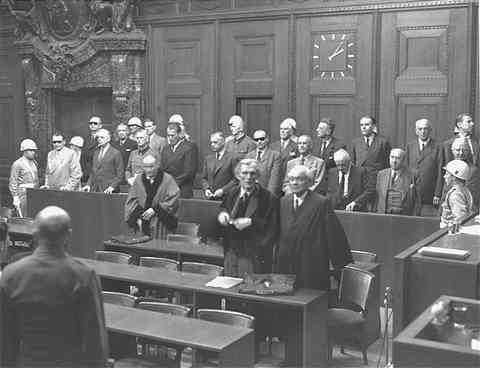
1946 Nuremberg Tribunal: On day 117, Hjalmar Schacht testifies on his own behalf:
Dr Dix: You were an opponent of the Treaty of Versailles. Would you like to say something about that?
Schacht: It surprised me indeed to hear that reproach from an American Prosecutor. The lieutenant who spoke is, perhaps, too young to have experienced it himself; but he should know it from his education; at any rate, for all of us who have lived through that time, it was one of the outstanding events that the Treaty of Versailles was rejected by the United States and, if I am not wrong, rejected with the resounding approval of the entire American people. The reasons prompting that action were also my reasons for rejecting the Treaty: it stood in contradiction to the Fourteen Points of Wilson, which had been solemnly agreed upon, and in the field of economics it contained absurdities, which certainly could not work out to the advantage of world economy. But I certainly would not accuse the American people of having been adherents of the Nazi ideology because they rejected the treaty.
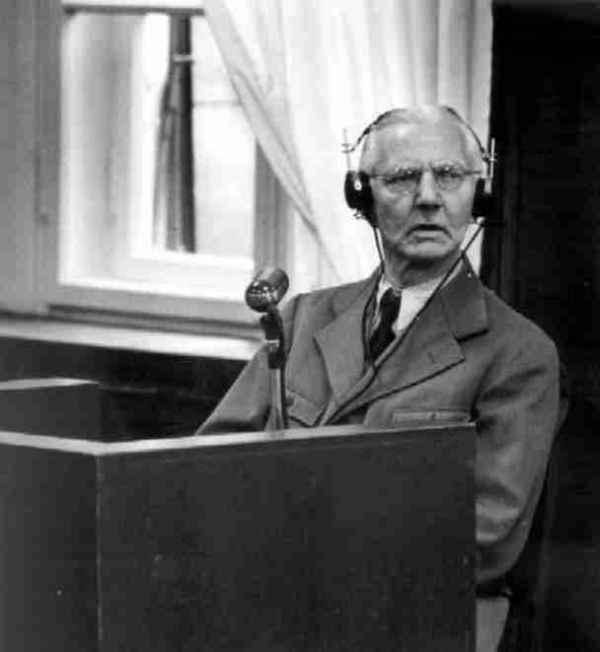
Hjalmar Schacht (whose two other Christian names, Horace Greeley, did not appear in the indictment, perhaps because Horace Greeley had once been a Presidential candidate, and was one of the greatest American newspaper editors) was the most intelligent of the defendants. Gilbert痴 report to Andrus described him as having "a brilliant mentality, capable of creative originality." In addition, he was astute and cunning. Even more important, for his defense, than his intelligence, was his character. Schacht was a fighter and, in fighting for his life, he wore stout armor: complete confidence in his innocence of all charges. He could have borne on his shield the words of [Prince von] Metternich, when looking back on his career: "Error has never crossed my mind."
Others might think this arrogance, but Schacht saw it as a statement of fact; those who questioned it, merely proclaimed their mental inadequacy to judge his career of intellectual achievement and patriotic service. He regarded his imprisonment as a scandal, writing in his memoirs: "I was described in an English newspaper as the most refractory of all the Nuremberg prisoners, and I am rather proud of it." On one occasion, he threw a mug of coffee at an American photographer, who was taking pictures of the defendants at lunch. He found the man痴 behavior vulgar, and added that he himself was eating peas at the time, so "it was not very flattering." He was deprived of his coffee ration for a week. On another occasion, Andrus threatened to deprive him of daily exercise because of his recalcitrance. Schacht was unperturbed: "[While at Nuremberg], secure in the possession of a perfectly clear conscience, I protested in the strongest possible [terms against] any and every form of unjust treatment."
In spite of having been in Flossenburg and Dachau since 1944, he could still write that conditions at Nuremberg were worse than any he had experienced. His reaction to being on trial varied from indignation, to contempt for his accusers. On arrival at Nuremberg, he had told Gilbert that he "hoped the trial would take a short time, so they could hang those other criminals, and let [the innocent] go home."
1948 Various:
Cold War: Organization of American States established:
The United States and 20 Latin American nations sign the charter establishing the Organization of American States (OAS). The new institution was designed to facilitate better political relations between the member states and, at least for the United States, to serve as a bulwark against communist penetration of the Western Hemisphere. [For further details, Click here]
Debut of original Land Rover:
The Land Rover, a British-made all-terrain vehicle that will earn a reputation for its use in exotic locales, debuts at an auto show in Amsterdam.
The first Land Rover, known as the Series 1, was the brainchild of Maurice Wilks, the head designer for the British car company Rover, of which his brother Spencer Wilks was the managing director. Maurice Wilks used an old American-made Willys-Overland Jeep to do work at his farm in England. However, the Jeep was plagued by mechanical problems and Wilks decided to design a more reliable vehicle. [For further details, Click here]
1955 Austria: A treaty between the former Allies and Austria treats Austria as a liberated nation and not a defeated one. Austria receives independence, and the four-power occupation is terminated. [Ever been had?‑‑Ed.]
1968 Soviet journalist Lev Bezymenski publishes The Death of Adolf Hitler which discloses previously unavailable information concerning the autopsies of what are said to be the bodies of Adolf Hitler and his entourage.
[It was not] until Russian journalist Lev Bezymenski wrote a book translated into English in 1968 that the West learned that the Russians performed autopsies on corpses recovered May 2, 1945, in shallow graves in a garden near the Berlin bunker. The bodies were believed to be Hitler, his wife and their two dogs. The United States was angered by the slow Russian revelations, but the Russian government defended its actions, saying 30 years was customary for declassification of secrets. Meanwhile, at the Yalta conference in 1945, Stalin declared that Hitler had escaped. Further adding to continuing suspicions are the autopsy reports concerning a missing testicle and superficial accounts of main body organs. Indeed, Bezymenski since has acknowledged that the autopsy reports were false, casting more mystery on Hitler's death. [For further details, Click here.]
1999 Neo-Nazi bomber: David Copeland detonates his third bomb in front of the Admiral Duncan pub and is arrested the night after. Over three successive weekends, Copeland placed homemade nail bombs, each containing up to 1,500 four-inch nails, outside a supermarket in Electric Avenue, Brixton, an area of south London with a large black population; in Brick Lane in the east end of London, which has a large Asian community; and in the Admiral Duncan pub in Soho's Old Compton Street, the heart of London's gay community. No warnings were given before the bombs exploded. The attacks claimed three lives, all in the Admiral Duncan.
Edited by Levi Bookin (Copy editor)
levi.bookin@gmail.com



Click to join 3rdReichStudies



Disclaimer: This site includes diverse and controversial materials--such as excerpts from the writings of racists and anti-Semites--so that its readers can learn the nature and extent of hate and anti-Semitic discourse. It is our sincere belief that only the informed citizen can prevail over the ignorance of Racialist "thought." Far from approving these writings, this site condemns racism in all of its forms and manifestations.
Fair Use Notice: This site may contain copyrighted material the use of which has not always been specifically authorized by the copyright owner. We are making such material available in our efforts to advance understanding of historical, political, human rights, economic, democracy, scientific, environmental, and social justice issues, etc. We believe this constitutes a "fair use" of any such copyrighted material as provided for in section 107 of the US Copyright Law. In accordance with Title 17 U.S.C. Section 107, the material on this site is distributed without profit to those who have expressed a prior interest in receiving the included information for research and educational purposes. If you wish to use copyrighted material from this site for purposes of your own that go beyond 'fair use', you must obtain permission from the copyright owner.
Please Note: The list-owner and the moderator of 3rdReichStudies are not responsible for, and do not necessarily approve of, the random ads placed on our pages by our web server. They are the unfortunate price one pays for a 'free' website.